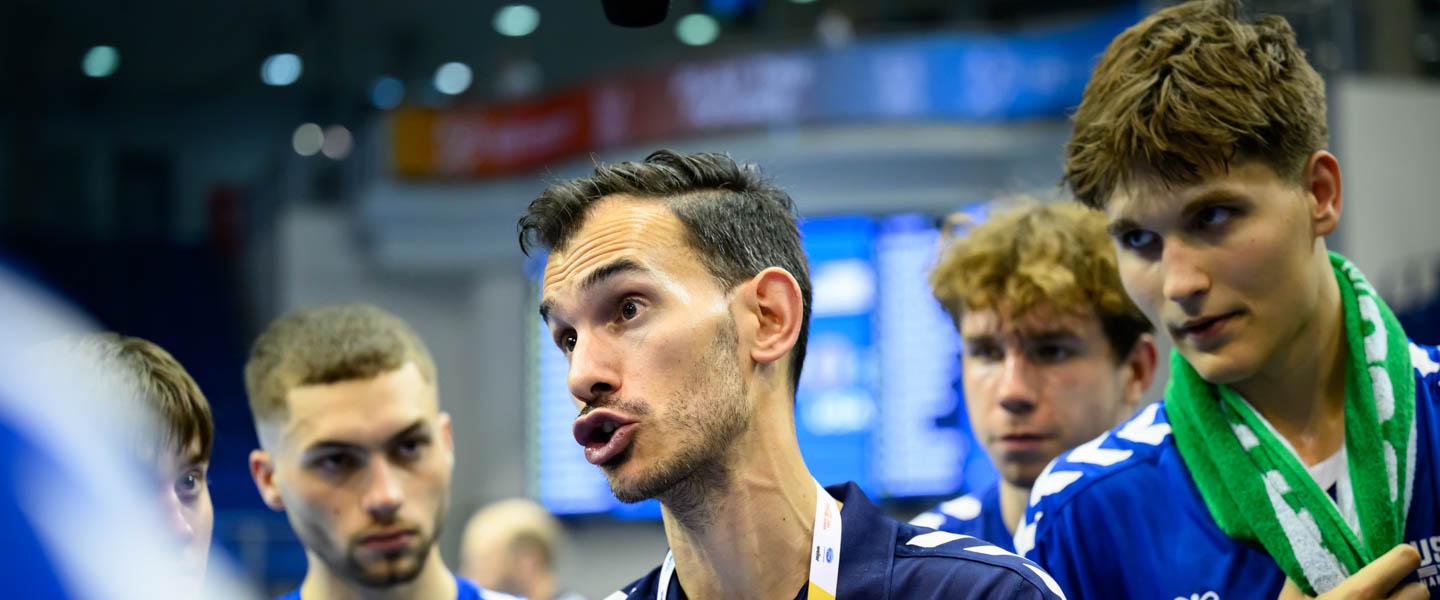A small step for USA, a big step for the US handball: “I see two or three players ready to step up to the senior squad”
24 Jun. 2023

The last time the United States of America were at the IHF Men's Junior World Championship, they ended up on the 22nd place, with one win and six losses at Spain 2019.
It was a hard challenge, yet the American team learnt some valuable lessons from games against Slovenia, hosts Spain or Serbia, earning their only win against Australia.
Four years later, in their second participation at the IHF Men's Junior World Championship, the USA got even harder opponents to face, with three European sides – reigning champions France and traditional powerhouses Poland and Croatia – in the preliminary round.
That meant that chances for a win at this stage of the competition were slim, virtually none, yet every lengthy process needs time, and every player needs to take the court, learn from every second spent on it and try to improve as much as possible in a short timeframe.
"First of all, it is a privilege to be here for a country like ours. As you know, we are still an emerging market for handball, and it is very difficult for us to get to the World Championship. So it is definitely an honour for us to be here, between the top 32 teams in the world. We are hoping that this competition gives all our players an opportunity to develop, to learn, so that by the Olympic Games in 2028, which will take place in America, at Los Angeles, we are able to reach our full potential," says USA's coach, Danilo Rojevic.
Born in Serbia, Rojevic became somewhat of a household name in American handball, being also the coach for club side San Francisco CalHeat, which took part in the 2021 IHF Men's Super Globe in Saudi Arabia.
Rojevic has been a true globetrotter, moving from Serbia to Switzerland when he was only two years old, joining his family as his father, a former football player, signed for Swiss club FC Sion.
In 2014, Rojevic moved to the United States of America, a dream of his, landing a job as a user researcher for one of the leading video game companies. He could not stay away from his first love, handball. Therefore he became a coach for the San Francisco CalHeat, and then took over the USA men's junior national team.
"Obviously, yeah, there is a lot of excitement, but we need to keep going obviously to maintain the level where we are. Of course, it's very difficult to play against European powerhouses like the ones we meet here, but we are taking it as a learning experience and hope to become better and better," says Rojevic.
Sure enough, the United States of America are getting better and better, with interest growing, especially after the senior team won their first-ever match at the 2023 IHF Men's World Championship in January.
In fact, the American side finished 20th with two wins in six matches, taking a 28:27 win against Morocco in the preliminary round and a 24:22 win against Belgium in the main round, which proved to be the most successful tournament the USA ever had in their history.
But the big objective is building a competitive squad for the Los Angeles 2028 Olympic Games, which means taking a close look at the current junior squad, whose players will be in their prime in five years' time.
"I see already like two or three players who can break into the senior squad and really have a high potential. Obviously, I think right now they are at a point where they really need to get into the right clubs and right setting for them to flourish and they need to get those moves right to be able to fulfil the potential they have," says Rojevic.
But until that point, the USA need to learn how to cope with heavy defeats, such as the ones inflicted by Poland (22:47) and France (17:45) at Germany/Greece 2023. Undoubtedly, they are crushing for young players with little experience, yet there is something positive in featuring at a high-profile competition.
Only one team, Greenland – 98 goals – conceded more goals than the USA after the first two matches of the preliminary round, while only five sides scored less goals than USA's 39, an average of 19.5 goals per game so far.
Moreover, as Rojevic puts it, there are players who are featuring throughout Europe and learning the basics in countries like Poland, France, Norway, Hungary or Germany. Most of them also have those countries' heritage, being either born there or whose parents were born there, which bodes well for the American way.
"I mean, you know the history of the United States in general. It's pioneers coming from many parts of the world, right? And I think our country, like our team, is a reflection of that, actually. I'm really happy we have this kind of bi-national players who are actually bringing that strong handball culture from Hungary, from Poland, from Germany, from Scandinavian countries," concludes Rojevic.
Indeed, the USA need some influence and know-how from these countries to really flourish. Indeed, the path is difficult and sometimes hard to understand. But with such an emerging market ready to be explored, they need to get up to date and start delivering, regardless of how big the losses are in such competitions.

